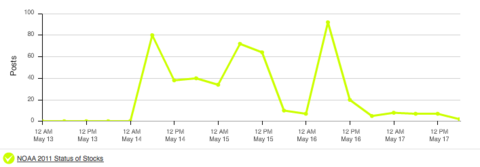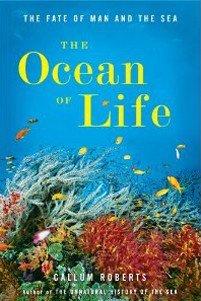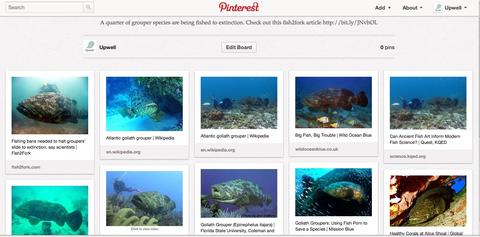Ocean of Life + NOAA Fisheries report + Endangered Species Day + Groupers: Sea Signals for the week of May 14, 2012
Ocean of Life
Buzz is building around the May 24th release of Callum Roberts’ new book The Ocean of Life. The Economist covered it on May 12th, and The Daily Beast shared an excerpt on May 14th (that appears in this week’s issue of Newsweek). The Mirror and Wall Street Journal covered it on May 18th, and Roberts is scheduled to be on The Diane Rehm Show in early June.
Amplification Action & Reaction
This week we reached out to 10 ocean conservation orgs by email and through Twitter to let them know about the book’s release, its coverage in The Daily Beast and The Economist, and how to request a review copy for their blog. At this writing, we’ve received one email reply from an ocean conservation organization who wrote to thank us for the heads up, and to say that they will share it through their social media channels.
Learnings
It’s possible that the other 9 organziations didn’t respond to our tweets and emails because a. the email subject lines weren’t enticing enough, b. the email was never opened because the recipient didn't recognize the sender, and/or c. we should have waited to reach out after the book’s release when anyone could pick up a copy..
NOAA Fisheries Report
On May 14, 2012, The National Oceanic and Atmospheric Administration (NOAA) released its Annual Report to Congress on the Status of U.S. Fisheries. Overall, the report was positive, announcing that six fish stocks were rebuilt, and 86% of the 258 stocks monitored were in good shape. However, 45 stocks are still overfished, showing room for improvement.
The report received early attention in major news outlets -- Associated Press, Fishnewseu, New York Times among others -- and was receiving moderate amounts of attention in social media.

Number of online mentions (including blogs, social media, and forums) of the 2011 NOAA Status of Stocks report between May 13th and May 17th, 2012.
Amplification Action & Reaction
We focused our efforts on reaching out to organizations focused on, or interested in overfishing and marine conservation and encouraged them to spread the story. Our message focused on the good news, but also recognized there’s still room for improvement.
The Blue Marine Foundation and The Black Fish responded positively to our emails asking them to write a blog post about the report or share through their social media channels.
The Blue Marine Foundations shared via Twitter on May 17. Our tweets to @oceanwildthings and @Bite_back were retweeted twice, and our @bite_back tweet was favorited.
Learnings
• Emailing efforts (100% success rate{2/2}) seem to produce more responses than @tweets (50% success rate {3/6}).
• The response to already-popular stories seems to be positive overall and relatively easy to garner modest attention for.
• Our amplification efforts may be more effective if we can reach outlets earlier in the story lifecycle.
Endangered Species Day
Our daily Tide Report tracked that May 18 was Endangered Species Day. We spotted @savingoceans using the day to tweet about endangered marine life and their activities to preserve it. However, other ocean and seafood-focused organizations were largely silent about their thoughts on Endangered Species Day.
Amplification Action
To spur conversation, we tweeted organizations focused on marine animal conservation and asked them which animals were on their minds today. We also reached out via email to two organizations and asked them to share Endangered Species Day with their communities.
As of this writing, we garnered some attention: Marine Bio shared Endangered Species Day with their Facebook audience and our conversation-starting tweets to organizations were re-tweeted twice. We’ll keep you updated on the progress of our efforts as they unfold.
Learnings
• We used the wrong hashtag in two tweets due to an errant space between “species” and “day.” Though not a horrible mistake -- one tweet with that error was still retweeted -- it’s a reminder to double check these kinds of things so we’re entering the right conversations.
• Again, email seems to be fairly reliable in starting conversations with organizations and soliciting engagement on issues with a 50% response rate in this micro-campaign.
Groupers
In a May 16th, fish2fork published a piece, Fishing Bans Needed to Halt Groupers’ Slide to Extinction, about a paper published in the journal of Fish & Fisheries. According to the study, a quarter of grouper species are being fished to extinction. The fish2fork piece followed a May 9th press release published by the California Academy of Sciences, and an article on ScienceDaily on the same day.
Amplification Action & Reaction
We shared the fish2fork article, and the stat that “a quarter of grouper species are being fished to extinction” via a Goliath Grouper Pinterest board featuring 14 photos of Goliath Groupers.
Goliath Grouper Pinterest screenshot
We shared the board on Facebook and Twitter, and tweeted 8 of the thirteen sources of the photos, which included a handful of ocean conservation organizations. We also searched for folks who had already tweeted about Goliath Groupers and/or the extinction stat, and let them know about the board.
The tweets received a 3 retweets and 1 comment: “goliath groupers rebounding well in the U.S., however, as far as we can tell w/o stock assessment.”
Learnings
- One of the most effective tweets was an MT (Modified Tweet) of a tweet by @XRAY_Magazine about the extinction stat. We added a link to our Pinterest Board before the MT.
What stories shall we amplify this week? Let us know! Email tips@upwell.us, or tweet us @upwell_us.


Add a comment